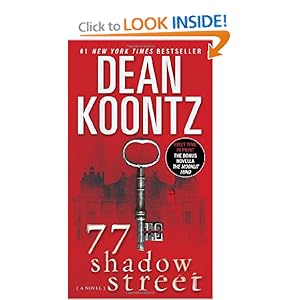
One thing that can be said for Dean Koontz is that he likes to mix it up. His characters may tend to look similar (as what author’s don’t?), but he likes to experiment with his stories. 77 Shadow Street, I think, is unusual among his books in featuring quite a large cast of characters and constantly jumping the point of view from one to another. I wish I could say I thought the experiment was a great success, but I wouldn’t call it a total failure either.
77 Shadow Street is the address of an exclusive residential apartment building, something like the Dakota in Manhattan, home to a number of wealthy and/or famous people. They include a drunken ex-senator, a stock broker with military experience, a single mother who writes hit country songs, a female novelist raising an autistic daughter, a retired lawyer, a working hit man, a famous geneticist, and others. When they first begin to notice strange phenomena in their building—lights, vibrations, and strangers appearing and disappearing in antique clothing—they aren’t very alarmed at first. Until the whole building is transported into a future time where the world is depopulated and strange life forms stalk the hallways, intent on turning them all into something other than human.
There’s much to like in 77 Shadow Street, especially for the Christian reader. The theme is transhumanism, the dream of combining humans and machines in order to “fix” humanity and improve the world. Koontz doesn’t contemplate that prospect with a lot of confidence.
The heart of the story, as is so often the case in a Koontz book, is with a child, Winston “Winny” Barnett. He’s a splendid character, a smart boy who doesn’t think he’s smart, forever bedeviled by the knowledge that his absent father is disappointed in him, consciously trying to do the right thing in situations of appalling horror, because he fears even more the idea of failing in courage.
Frankly, I would have liked to have spent more time with Winny, and less with the other residents of 77. They’re not bad characters. They’re all well-drawn. But I thought the book lost focus as the narrative line jumped from here to there. Or maybe I just lack the proper powers of concentration.
77 Shadow Street isn’t a bad read, and the message (I think) is good. A plus for some will be the inclusion of the novella, The Moonlit Mind, which I’d already read. I wouldn’t rank this book high among Koontz’s work. Kudos for his willingness to take a chance, though.
Lars Walker is the author of several published fantasy novels, the latest of which is an e-book, Troll Valley.
